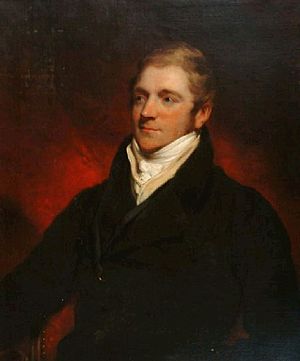Thomas Tooke facts for kids
Quick facts for kids
Thomas Tooke
|
|
|---|---|
 |
|
| Born | 28 February 1774 Kronstadt, Russian Empire
|
| Died | 26 February 1858 (aged 83) London, England
|
| Nationality | English |
| Field | Econometrics |
| School or tradition |
Classical economics |
Thomas Tooke (/tʊk/; 28 February 1774 – 26 February 1858) was an English economist. He was famous for his writings about money and how economies work. After he passed away, the Statistical Society created a special economics position and a prize in his honor. These were at King's College London.
Besides his studies, Thomas Tooke was also a successful businessman. He served as a leader for the Royal Exchange Assurance, a large insurance company. He also chaired the St Katharine Docks company, which managed important docks. He was even one of the first directors of the London and Birmingham Railway.
Contents
Thomas Tooke's Life Story
Thomas Tooke was born in Kronstadt, Russia, on February 29, 1774. He was the oldest son of William Tooke, who was a chaplain there. At 15, Thomas started working in a business in St Petersburg. Later, he became a partner in two London companies.
Getting Involved in Economics
Tooke didn't get deeply involved in economic discussions until 1819. That year, he spoke to Parliament about the Bank of England starting to use cash payments again. He was one of the first to support the idea of free trade. This means allowing goods to be traded between countries without high taxes.
He helped write an important document for London merchants in 1820. This document asked the government to support free trade. The government, especially through William Huskisson, began to follow these ideas.
Founding the Political Economy Club
To further support free trade, Tooke helped start the Political Economy Club in 1821. He founded it with other famous thinkers like David Ricardo and Robert Malthus. He was an active member of this club throughout his life.
Views on Money and Banking
Tooke was involved in debates about paper money. These discussions led to the Bank Charter Act 1844. This law aimed to stop too much paper money from being printed. However, Tooke disagreed with parts of this law. He believed that changes in how the Bank of England was run, along with keeping more gold, would work better.
He also spoke to many government committees about economic issues. For example, he advised on farming problems in 1821. He was also part of a group that looked into factories in 1833.
Later Life and Honors
Thomas Tooke stopped his own business work in 1836. But he continued to be a leader at the Royal Exchange Assurance from 1840 to 1852. He also led the St. Katharine's Dock Company. He became a Fellow of the Royal Society in 1821. This is a very important group for scientists. In 1853, he became a special member of a French academic group.
He lived in London and died on February 26, 1858. He is buried at Kensal Green Cemetery. After his death, the Tooke professorship in economics was created in his memory.
Thomas Tooke's Important Works
Tooke followed the ideas of economists like Ricardo. He supported the findings of a group that studied money and gold in 1810. After a law in 1819 brought back cash payments, prices for many goods fell. Some people thought this was because less money was available.
Tooke wrote his first book, Thoughts and Details on the High and Low Prices of the last Thirty Years (1823), to argue against this idea. He continued this argument in later books. He carefully looked at what makes prices change. He believed that price changes were due to things related to the goods themselves. He thought they were not caused by how much money was in circulation.
The History of Prices Series
Tooke is most famous for his large work, History of Prices and of the State of the Circulation during the Years 1793–1856. This work has six volumes and was published between 1838 and 1857.
The first four books looked at:
- Prices of grain and what affected them.
- Prices of other goods.
- How money was moving around.
The last two books, written with William Newmarch, discussed railways and free trade. They also covered banking in Europe and the effects of new gold discoveries.
The first two volumes, published in 1838, covered the years 1793 to 1837. Tooke concluded that high prices between 1793 and 1814 were due to bad weather for crops. They were also caused by trade problems during the Napoleonic Wars. He believed lower prices later were due to better harvests and less war. Also, improvements in manufacturing helped.
The History of Prices was finished in 1857, the year before Tooke died. This entire work gives a detailed look at the financial and business history of that time. In the later books, Tooke showed how his ideas changed over time. He moved away from some earlier beliefs about how money works.
Debates on Money Supply
Some economists, like Samuel Jones Loyd, believed that banks could directly affect prices by printing too much money. They thought this could lead to financial speculation. They argued that banks should be stopped from printing money freely.
Tooke, however, argued differently. He believed that if paper money could be easily exchanged for gold, its value would stay the same as gold. He thought that banks could not just print more money whenever they wanted. He also argued that the amount of money in circulation did not directly control prices. He observed that prices often changed before the amount of money in circulation changed.
Family Life
In 1802, Thomas Tooke married Priscilla Combe. They had three sons together.
 | Frances Mary Albrier |
 | Whitney Young |
 | Muhammad Ali |

